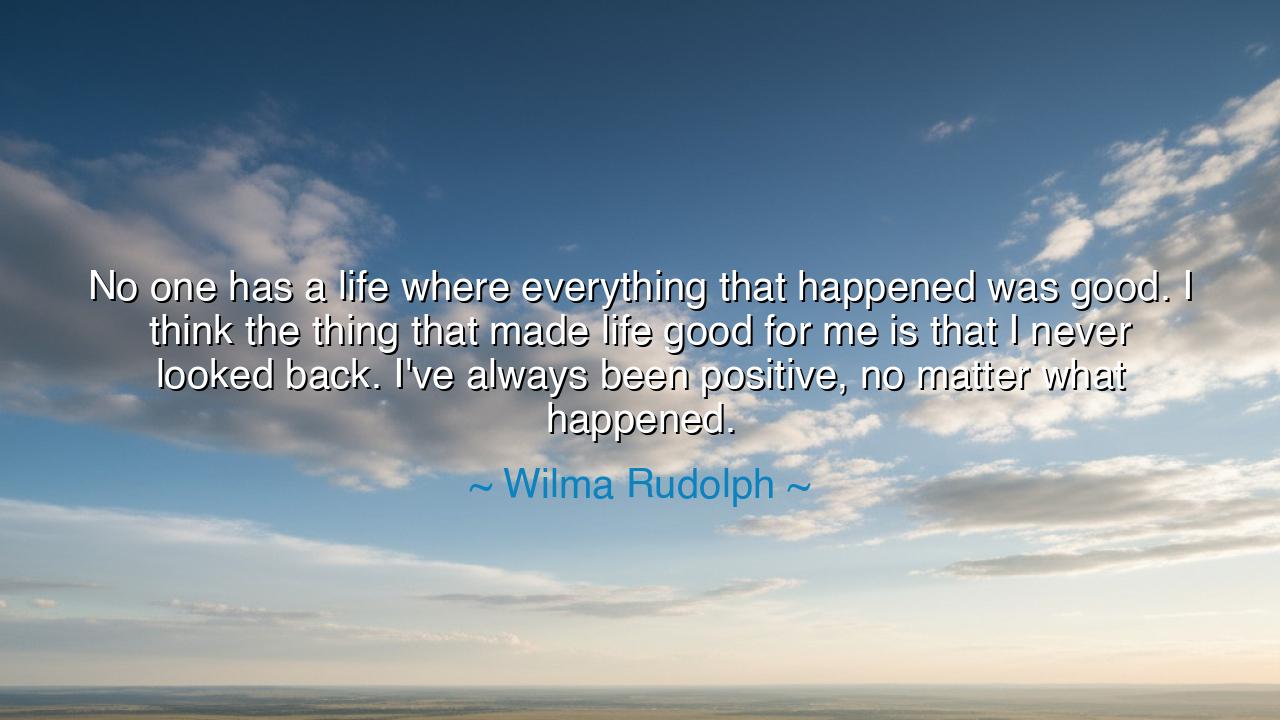
No one has a life where everything that happened was good. I
No one has a life where everything that happened was good. I think the thing that made life good for me is that I never looked back. I've always been positive, no matter what happened.






When Wilma Rudolph declared, “No one has a life where everything that happened was good. I think the thing that made life good for me is that I never looked back. I've always been positive, no matter what happened,” she spoke not only as a champion of sport, but as a prophetess of endurance. Her words carry the ancient wisdom that suffering is woven into the tapestry of every life, yet it is the heart’s response that transforms trial into triumph. She reminds us that to be human is to walk through hardship, but to be great is to walk with unwavering positivity.
The ancients themselves taught this truth. The Stoic philosopher Seneca declared that adversity is not sent to crush us, but to reveal our strength. Likewise, Homer sang of Odysseus, who endured shipwreck, betrayal, and countless sorrows, yet pressed forward, never allowing the weight of his past to enslave him. Wilma’s words echo these eternal voices: to look backward with bitterness is to stumble; to look forward with courage is to arrive at glory.
Her own life embodies the teaching. Born into poverty and struck with polio as a child, Wilma was told she would never walk again. Yet she refused despair. Through tireless effort and relentless positivity, she not only walked but ran — faster than any woman of her time. At the 1960 Olympics, she claimed three gold medals, becoming a symbol of hope to millions. If she had looked back at her illness, her pain, her limitations, she would have remained bound. But by choosing never to look back, she transformed hardship into greatness.
History is filled with others who walked this same path. Consider Abraham Lincoln, who faced business failures, personal grief, and repeated political defeats. Had he dwelt on these sorrows, history would have forgotten him. Instead, he moved forward, carrying positivity in the midst of darkness, until he stood as the leader who preserved a nation. Like Wilma, he knew that no life is free from sorrow, but that perseverance and hope make life meaningful.
The heart of this teaching is simple yet profound: the past cannot be changed, but the future can be shaped. To fix one’s gaze on what has been lost is to give power to shadows; to fix it on what may yet be gained is to walk in light. Positivity is not ignorance of pain — it is the choice to transcend it, to refuse its mastery, and to transform it into strength.
The lesson for us is clear: do not expect life to be without hardship. Instead, prepare your soul to endure, to adapt, and to overcome. When trials come, do not be chained by the memory of suffering. Like Wilma, choose to look forward. Choose to speak words of hope when despair beckons. Choose to see opportunity where others see only ruin. In this choice lies the power to transform your life.
In practice, this means cultivating habits of gratitude, reminding yourself each day of the blessings that remain. When memories of failure or pain arise, acknowledge them, but do not dwell on them. Instead, turn your mind to the steps you can take now, in this moment, to move forward. Surround yourself with those who uplift you, and be that source of uplift to others.
Therefore, let us carry Wilma Rudolph’s wisdom: life is not made good by the absence of hardship, but by the presence of positivity. Do not look back in despair; walk forward in courage. In this way, your story, like hers, will not be defined by what you suffered, but by what you overcame — a shining testament to the strength of the human spirit.






ATAnh Tuan
This statement evokes admiration for her resilience, but I also feel curious about the practical side. How did she maintain positivity in moments of extreme adversity? Is this something that can be learned or cultivated intentionally, or is it largely innate? I’d like to hear examples of techniques or habits that help people focus on moving forward rather than dwelling on what went wrong.
MTHo Thi My Tram
Reading this makes me reflect on the role of mindset in shaping life experiences. How much of life’s quality is determined by attitude versus circumstances? Could her philosophy of never looking back be seen as a form of mental strength, or might it be an avoidance strategy? I’d love perspectives on how positivity interacts with reflection and whether letting go of the past is always the best path forward.
LTlam tran
I find this quote comforting yet challenging. It suggests that maintaining a positive outlook is key to making life good, but I question whether relentless positivity can sometimes suppress genuine emotions. Can someone truly be positive no matter what happens, or does it risk ignoring pain and struggles? I’d like to explore how one can remain hopeful while still acknowledging setbacks in a healthy, constructive way.
TB02.Nguyen Thi Thai Bao
This perspective is truly inspiring because it emphasizes resilience and forward momentum. I wonder, though, is it always realistic to avoid looking back, or can reflecting on the past sometimes provide valuable lessons? How do people balance positivity with the need to process negative experiences? I’m curious if her approach can be applied universally or if it depends on personality and circumstances, especially when facing significant hardships.